The Future Of Travel, Economist review

Travel and tourism accounts for over 330m jobs globally, that is 1 in 10 of the world’s total (WTTC). Travel will recover and may even become a better experience once everyone is reassured that it is safe to do so. The urge to travel is unlikely to be permanently affected by the global pandemic even if some destinations take time to recover. All forecasts predict travel and tourism will return to pre-pandemic levels over the next few years and then continue on a path to growth. A growing global middle class will see the Chinese joined by Indians, Malaysians and Indonesian’s and this could bring significant shifts over time.
A recovery could begin in earnest in the second half of this year once vaccines start to tame the virus and those who’ve been in lockdown take advantage of cheap getaways. Nearly three-fifths of international travellers arrived and departed by plane in 2019, compared with only 5% by sea and 1% by train (UNWTO)
Going on holiday makes up 55% of the trips, business travel 11% and the rest was to visit family and friends, travel for religious reasons and medical treatments and whilst recovery is not quite there yet optimists predict that in the long run, the link between growing wealth and the urge to travel will remain unbroken and that the pandemic may accelerate trends that will eventually make travel both easier and less damaging.
“Today’s travel industry may have taken a battering – but the new one that emerges could be better than ever.”
There will be changes in the way we travel and work, with business travel currently in retreat because of Zoom and all the other video conferencing services. However, once meetings in person resume, this will pick up as personal contact is hard to replicate digitally. Therefore, it’s believed that the number of trips is likely to fall, but their length may increase.
A new class of private traveller has emerged – those who used to fly first class, but are now chartering a private jet because they want to avoid crowds.
In October data collected by IATA found that only 44 out of 1.2bn passengers since the start of 2020 were known or thought to have contracted C19 on a plane. Commercial planes are fitted with a grade of air filter found in operating theatres and so the main obstacles to a rapid rebound are more likely to be closed borders and ever-changing regulations for entry. Vaccine passports may be the solution, together with widespread fast, accurate tests for a standard pre-departure regime that could allow a restart of international travel.
Now is the chance for countries to rethink tourism industries to turn it into a better one. Such is the stunning growth of tourism that the 72% decline in trips in the first 10 months of 2020 on a year earlier merely took international travel back to where it was in 1990. Tourism is a resilient industry but some parts of the tourist economy will do better than others. There is a rising preference for self-catering and private accommodation over hotels currently. Coastal and rural locations, far from crowds, will recover more quickly than cities. Driving is more popular, but this behaviour is seen as temporary.
There is an expectation that people will leap at the chance to get away as soon as they can after a year of lockdown. Health and hygiene will re-emerge as central to holiday planning and travel companies are adopting more flexible rebooking policies accordingly. In future, personalised customer data should allow travel firms to recommend holidays in a more focused way.
Covid 19 presents a “once in a lifetime” opportunity to move towards more sustainable and resilient models of tourism development” says the OECD. Concerns about the impact of tourism on the environment predate the pandemic, but regenerative travel is being seen as key. Tourism also broadens awareness of different cultures and environmental issues and helps pay for wildlife conservation, as well as providing employment and economic development.
Many destinations failed to strike a balance between tourist numbers and local sensibilities, so C19 offers the chance not only to reset tourism to reduce the numbers who spend the least, but also to spread them out. Concentrating on attracting fewer tourists ready to spend more is one way to promote a healthier business and sustainability may become a more important guide to choices as awareness of climate change grows.
For all those governments that redesign their tourism strategies to keep down crowds and protect the environment, others may compete by racing to the bottom, using deep discounts to fill hotels and planes. Tourist numbers will recover and continue to grow either way. Greater efforts to manage them carefully should make for a better experience for everyone.
As the world gets richer and populations age, the numbers with the time and means will keep growing. There is a vast untapped market; around 80% of the world’s population has never stepped foot on a plane, so it’s still a rarity for most. The price of travel may not have much further to fall, but greater speed is certainly on the horizon.
